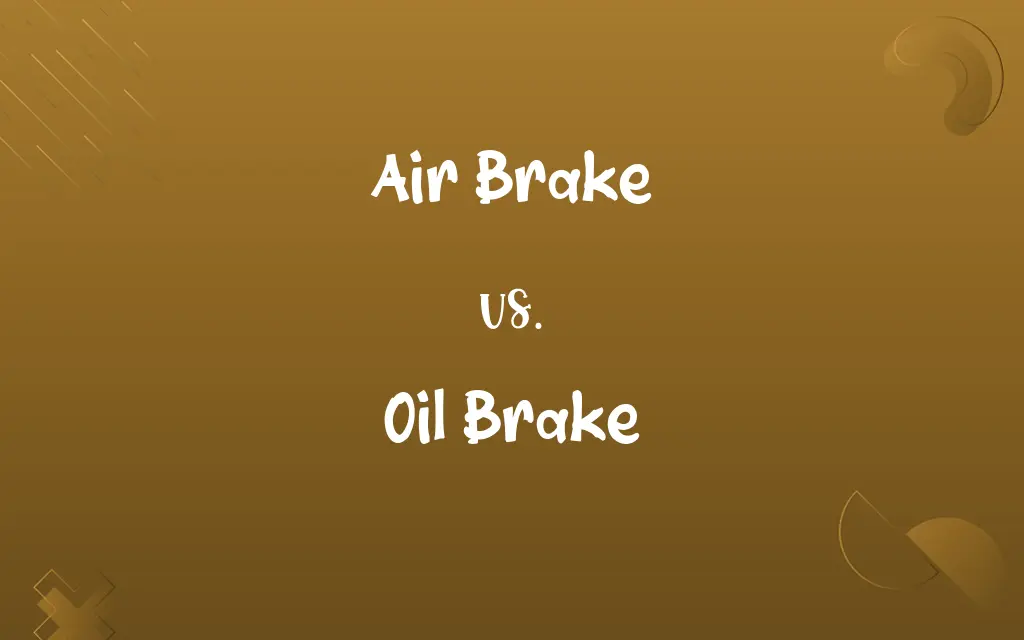Air Brake vs. Oil Brake: Know the Difference

By Shumaila Saeed || Updated on December 25, 2023
Air Brakes use compressed air to activate the braking system, commonly in heavy vehicles, while Oil Brakes, or hydraulic brakes, use fluid pressure for braking, typical in cars and motorcycles.

Key Differences
Air Brakes operate by using compressed air to exert pressure on the brake pad, creating friction to slow down a vehicle. Oil Brakes, also known as hydraulic brakes, use a fluid-filled system where pressure is applied to brake fluid, which then activates the brake pads or shoes.
Shumaila Saeed
Dec 10, 2023
Air Brakes are primarily used in heavy-duty vehicles like buses, trucks, and trains due to their reliability and effectiveness in large vehicles. Oil Brakes are more commonly found in passenger cars, motorcycles, and lighter vehicles, where a compact and efficient braking system is required.
Shumaila Saeed
Dec 10, 2023
Air Brakes require regular maintenance to ensure air compressors and lines are functioning properly. Oil Brakes, on the other hand, require monitoring of the hydraulic fluid levels and regular replacement of the brake fluid to maintain effectiveness.
Shumaila Saeed
Dec 10, 2023
Air Brakes can have a slight delay in response due to the time it takes to build air pressure, but are highly effective once engaged. Oil Brakes generally provide a quicker response as the hydraulic fluid transmits pressure instantly, offering more precise control.
Shumaila Saeed
Dec 10, 2023
Air Brakes are designed with a fail-safe mechanism where if air pressure drops, the brakes automatically engage, ensuring safety. Oil Brakes require an intact system; any leak in the hydraulic fluid can lead to brake failure, necessitating regular checks for leaks.
Shumaila Saeed
Dec 10, 2023
ADVERTISEMENT
Comparison Chart
Mechanism
Uses compressed air to activate brakes
Uses hydraulic fluid pressure to activate brakes
Shumaila Saeed
Dec 10, 2023
Typical Usage
Heavy vehicles like buses, trucks, and trains
Cars, motorcycles, and light vehicles
Shumaila Saeed
Dec 10, 2023
Response Time
Slight delay due to air compression
Instantaneous due to fluid dynamics
Shumaila Saeed
Dec 10, 2023
Safety Features
Fail-safe mechanism if air pressure drops
Requires intact system, vulnerable to fluid leaks
Shumaila Saeed
Dec 10, 2023
ADVERTISEMENT
Air Brake and Oil Brake Definitions
Air Brake
Air Brakes feature a fail-safe design, automatically activating under low air pressure.
The air brake's fail-safe feature prevented a potential accident when the air pressure dropped.
Shumaila Saeed
Dec 03, 2023
Oil Brake
Oil Brakes are common in smaller vehicles, utilizing a fluid-based mechanism.
The compact design of oil brakes makes them ideal for passenger cars.
Shumaila Saeed
Dec 03, 2023
Air Brake
Air Brakes use compressed air to apply pressure on brake pads, slowing heavy vehicles.
The truck driver relied on the air brakes to control the vehicle downhill.
Shumaila Saeed
Dec 03, 2023
Oil Brake
Oil Brakes, or hydraulic brakes, use fluid pressure for braking in vehicles.
Most cars have oil brakes for their responsive and smooth operation.
Shumaila Saeed
Dec 03, 2023
Air Brake
Air Brakes provide effective stopping power for heavy-duty transportation.
Trains use air brakes to manage their massive weight and speed.
Shumaila Saeed
Dec 03, 2023
ADVERTISEMENT
Oil Brake
Oil Brakes operate by transmitting brake force via hydraulic fluid.
The efficiency of oil brakes is evident in their quick and smooth response.
Shumaila Saeed
Dec 03, 2023
Air Brake
Air Brakes are a type of brake system designed for large vehicles, utilizing air pressure.
Air brakes are essential for the safe operation of city buses.
Shumaila Saeed
Dec 03, 2023
Oil Brake
Oil Brakes provide precise braking control through a hydraulic fluid system.
Oil brakes in motorcycles offer riders fine control over stopping.
Shumaila Saeed
Dec 03, 2023
Air Brake
Air Brakes are known for their reliability and safety in large-scale transport.
The safety of air brakes makes them ideal for long-haul trucks.
Shumaila Saeed
Dec 03, 2023
Oil Brake
Oil Brakes require regular fluid checks to maintain their efficiency and safety.
Regular maintenance of oil brakes ensures reliable performance in emergency stops.
Shumaila Saeed
Dec 03, 2023
Repeatedly Asked Queries
How do Oil Brakes work?
Oil Brakes work by using hydraulic fluid pressure to activate the brake pads.
Shumaila Saeed
Dec 10, 2023
How do Air Brakes work?
Air Brakes work by using air pressure to push the brake pads against the wheel, slowing the vehicle.
Shumaila Saeed
Dec 10, 2023
Where are Oil Brakes commonly used?
Oil Brakes are typically found in passenger cars and motorcycles.
Shumaila Saeed
Dec 10, 2023
Do Air Brakes require special maintenance?
Yes, Air Brakes require regular checks of the air compressor and air lines.
Shumaila Saeed
Dec 10, 2023
What is an Air Brake?
An Air Brake is a type of brake system for heavy vehicles, using compressed air to apply braking force.
Shumaila Saeed
Dec 10, 2023
Where are Air Brakes commonly used?
Air Brakes are commonly used in buses, trucks, and trains.
Shumaila Saeed
Dec 10, 2023
Are Air Brakes safe?
Yes, Air Brakes are safe, with fail-safe mechanisms for added security.
Shumaila Saeed
Dec 10, 2023
What is an Oil Brake?
Oil Brake, or hydraulic brake, is a brake system using fluid pressure, common in cars and motorcycles.
Shumaila Saeed
Dec 10, 2023
What happens if Oil Brakes leak fluid?
Leaking fluid in Oil Brakes can lead to brake failure, making it critical to check for leaks.
Shumaila Saeed
Dec 10, 2023
Are Oil Brakes affected by temperature?
Oil Brakes can be affected by temperature changes, which may impact fluid viscosity and braking efficiency.
Shumaila Saeed
Dec 10, 2023
Can Air Brakes fail due to air leaks?
Yes, air leaks can lead to reduced effectiveness or failure in Air Brakes.
Shumaila Saeed
Dec 10, 2023
What is the main advantage of Oil Brakes?
The main advantage of Oil Brakes is their quick response and precise control.
Shumaila Saeed
Dec 10, 2023
What makes Air Brakes ideal for heavy vehicles?
Their robustness and fail-safe design make Air Brakes ideal for heavy vehicles.
Shumaila Saeed
Dec 10, 2023
Why are Oil Brakes preferred in small vehicles?
Oil Brakes are preferred for their compact size and precise braking in smaller vehicles.
Shumaila Saeed
Dec 10, 2023
How does weather affect Air Brakes?
Extreme cold can impact Air Brakes, potentially causing condensation and freezing in the system.
Shumaila Saeed
Dec 10, 2023
Can Air Brakes be used in passenger cars?
Air Brakes are not typically used in passenger cars due to their size and complexity.
Shumaila Saeed
Dec 10, 2023
What's the cost difference between maintaining Air and Oil Brakes?
Generally, maintaining Oil Brakes is less costly compared to the more complex Air Brake systems.
Shumaila Saeed
Dec 10, 2023
Is it easier to install Air Brakes or Oil Brakes?
Installation complexity varies, but Oil Brakes are generally simpler due to fewer components.
Shumaila Saeed
Dec 10, 2023
How do Oil Brakes enhance driving safety?
Oil Brakes enhance safety with their immediate response and consistent performance.
Shumaila Saeed
Dec 10, 2023
How often should Oil Brakes be serviced?
Oil Brakes should be serviced regularly, with brake fluid changes as recommended.
Shumaila Saeed
Dec 10, 2023
Share this page
Link for your blog / website
HTML
Link to share via messenger
About Author
Written by
Shumaila SaeedShumaila Saeed, an expert content creator with 6 years of experience, specializes in distilling complex topics into easily digestible comparisons, shining a light on the nuances that both inform and educate readers with clarity and accuracy.








































































